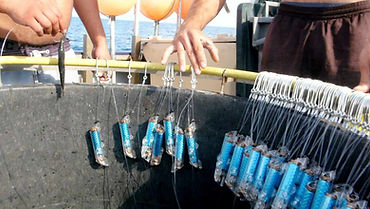By: Austin Fang
Far off in the ocean, a blue shark swims toward a mysterious hook with a blue cylindrical device hanging from it. As he gets closer to explore, and to get a taste, he gets a sudden feeling in his brain that tells him to stay away. He decides to not bother the hook.
Little did sharks know, humans have decided to take action to save them. This little cylindrical gadget is known as SharkGuard – and it might completely revolutionize the shark’s survival rates.
“One major problem facing sharks and rays is bycatch, where the creatures get accidentally snagged by fishermen targeting other fish like tuna,” says David Shiffman, a marine biologist at Arizona State University. This new gadget allows the shark deaths by bycatch to decrease, therefore there are more sharks in the ocean.
SharkGuard uses the sharks sixth sense, known as ampullae of Lorenzini. Through this sense, sharks are capable of detecting electric fields through organs in their heads. SharkGuard sends small electric fields, overwhelming the shark’s brain for a split second, causing them to want to get away from the device unharmed.
Another Marine Biologist, Rob Enever, and his colleagues tested out this invention in the summer of 2021. He had two fishing vessels, each with fishing poles. One had hooks with SharkGuard, one did not. Their studies proved to be successful, as the sharks didn’t want to get too close to the hooks equipped with SharkGuard.
Another study found out that SharkGuard reduces 91% of the sharks that died from bycatch, going from an average of 6.1 to 0.5 blue sharks caught per 1000 hooks. Millions of sharks die from bycatch each year, so this new invention will save an abundance of sharks.
However, there are still some difficulties. For example, studies found out that with SharkGuard, a considerably low amount of tuna was caught, compared to hooks without SharkGuard. Researchers have guessed that these tuna have also been bothered by the electrical waves. Also, the SharkGuard team is also making the device more modern and easy to manage. For example, instead of having to switch the battery every few months, the team is working to make it a rechargeable device.
We’re at a situation now where many of our pelagic species are either critically endangered, endangered or vulnerable,” Enever says. However, “there’s people out there … trying to resolve these things. There’s hope for the future.”











